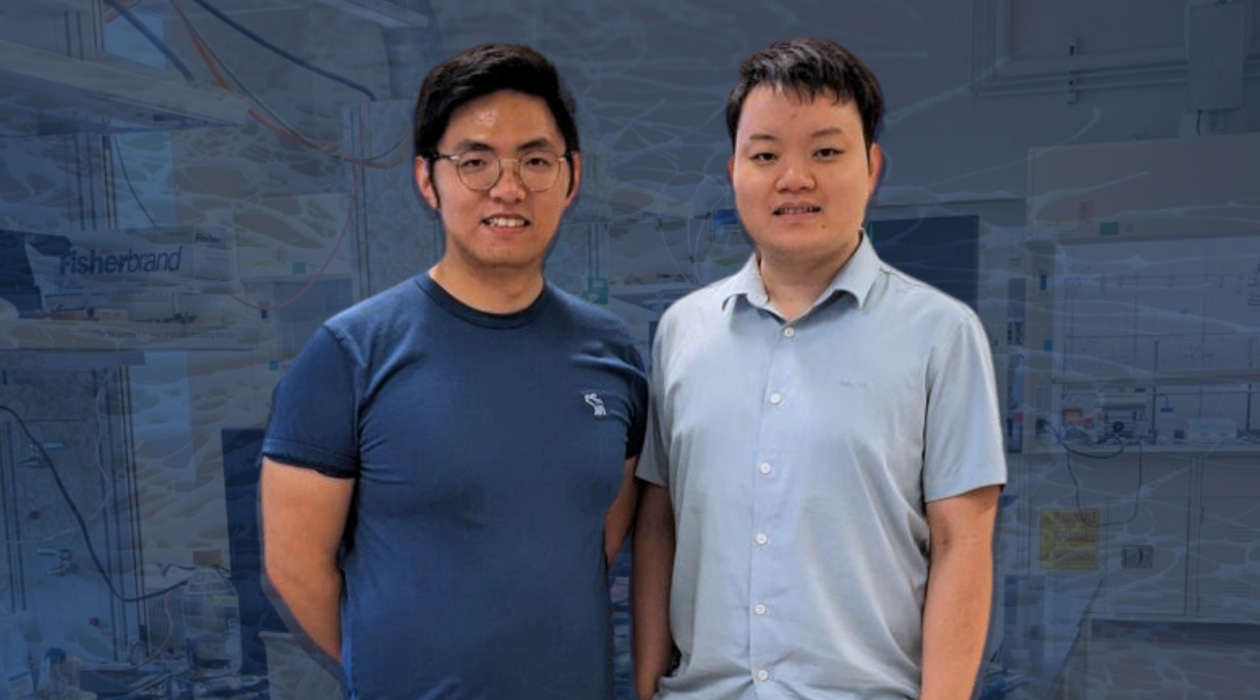‘Drug Depot’: A Novel Technology for Prevention of Post-Surgical Triple-Negative Breast Cancer Recurrence

Left to right: Yang Bo and Hua Wang / Jonathan King
Hua Wang (RBTE), professor of materials science and engineering, published new research in Materials Today Bio demonstrating the development of a novel technology to prevent post-surgical recurrence of breast cancer, especially triple-negative breast cancer (TNBC).
An estimated 310,000 American women will be diagnosed with breast cancer in 2024, according to the American Cancer Society. TNBC accounts for as many as 15% of these diagnoses and is statistically more common in women under age 40, Black women, or women with a BRCA1 mutation. Lumpectomy followed by adjuvant chemotherapy or radiation therapy is the mainstream clinical treatment, and yet TNBC patients experience high rates of post-surgical cancer recurrence.
The underlying challenge for researchers and clinicians is the ability to deliver anticancer drugs to the tumor resection site whenever needed after surgery.
To address this fundamental problem, the Wang lab designed an innovative method with promise to reduce high cancer recurrence rates after surgical resection. Considering the predominant clinical practice of grafting autologous fat tissue for breast reconstruction, Wang’s lab developed a fat tissue-based “drug depot” to catch anticancer therapeutic “cargo” from the bloodstream, which then gradually releases to neighboring cells. This adaptive technology is novel in its methodology and practical in leveraging the existing surgical reconstruction process.
“This research project is more personal, motivated by personal experience of someone close to me who suffered from breast cancer. Surgical resection and the concern about potential cancer recurrence is a difficult experience for women with breast cancer,” said Wang. “We wanted to find a solution that would limit further complications and cancer recurrence. After the conversations with the breast cancer oncologists, we asked ourselves, ‘How can we find a strategy to label the fat tissue used for the breast reconstruction and convert it into a targetable drug depot?’ We wanted to adapt our strategy to clinical practice and leverage the strengths of our lab’s existing chemical tagging technology. We’ve been using this technology for quite some time, and its proven efficacy seemed appropriate for this common breast cancer problem.”
Wang’s “depot and cargo method” introduces their lab’s unique click chemistry, metabolic glycan labeling technology into the breast cancer reconstruction procedure. Metabolic labeling of primary cells, as demonstrated by Wang’s team, is not currently reported in research methods. The team demonstrated that azido-labeled primary adipocytes, upon grafting to the tumor resection site, can act as a “drug depot,” capturing circulating dibenzocyclooctyne (DBCO) drugs in vivo via efficient click chemistry. Using a linkage between DBCO and the drug, the conjugated drugs (or “cargo”) can be gradually released from adipocyte membranes to affect neighboring residual tumor cells for the improved prevention of tumor recurrence and metastasis in a 4T1 TNBC model. This targeting approach holds promise for wide application to other cancer therapeutics.
First author of the paper Yang Bo, who now works as a postdoctoral researcher at the University of Washington, said of the discoveries in this research: “It was intriguing to discover that metabolically inert primary adipocytes could be labeled with azido groups by unnatural sugars. This key feature makes labeled adipocyte a future platform for post-operative targeted treatment of residual cancer cells. Knowing that our targetable drug depot holds promise for post-surgical cancer therapeutics is very encouraging. This project has inspired me to dig deeper into the clinically relevant techniques of my future research endeavors that might improve the efficacy of cancer-targeted treatments.”
---
Hua Wang is an Assistant Professor of Materials Science and Engineering and is an affiliate of the Department of Bioengineering, the Materials Research Laboratory, the Beckman Institute, the Carle College of Medicine, the Cancer Center at Illinois, and the Carl R. Woese Institute for Genomic Biology.
The paper “Primary adipocytes as targetable drug depot to prevent post-surgical cancer recurrence” is available online: doi.org/10.1016/j.mtbio.2024.101020
